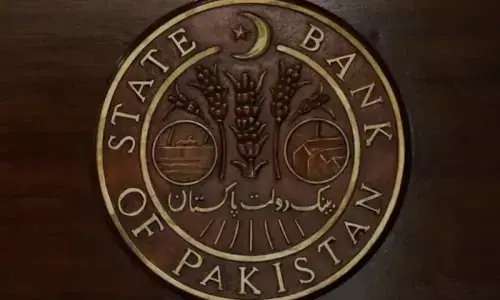LAHORE: As short-term inflation, measured by Sensitive Price Index, hit 41.07 per cent in the week ended on March 2, life for the overwhelming majority of Pakistan becomes next to impossible as international lenders have also warned against looming social unrest.
Also, the Consumer Price Index for February jumped to 31.50pc —the worst since June 1975. It was followed by a sharp decline in rupee value, with the government raising energy prices and taxes to meet the International Monetary Fund’s loan conditions. All these factors set the platform for a new inflation record.
Social chaos now seems to be a clear possibility, even probability, if different segments of society, Dawn spoke to, are to be believed. They say there were times till a few years ago when manoeuvring of expenses could help people survive. Not anymore! Now, expenditures like health, new clothing, social travelling, or other avoidable expenses have been stopped to have two meals a day. Squeezed buying power with unprecedented inflation, they believe that their life is reduced to basic meals and all other expenses, so far considered normal, have now fallen into the category of luxury.
“If food expenses eat up 50pc of one’s income, one can imagine what kind of cost-cutting is required to survive,” says Muhammad Khan – a cart pusher on Brandreth Road, an industrial market in Lahore. “With a family of six, we need at least 20 breads (rotis) twice a day, which cost a staggering Rs600 (at a rate of Rs15 each) for this basic food item. All prices of pulses range between Rs300 to Rs450 per kg. Add other essentials (ghee, salt, chillies, coriander etc) and basic family meals cost me more than Rs1,000 a day and I cannot make that kind of money every day given my age and health. Do I have a margin of cost-cutting? I am in perennial debt to meet two meals a day requirement; all the rest is now a luxury for us,” he says, blinking back his tears.
Daily wage, low-income workers say they have to forego essential needs in order to survive
Another tragic part of this inflation is that it does not treat all of us equally, explains Jameel Ahmad — a labourer from Quetta residing in the city. In Lahore, a roti costs Rs15 each. In my native town, its price is Rs30. My family purchases it daily at that price. The weight of this inflation depends on location as well. In Lahore, a 20kg flour bag costs around Rs1,750, whereas it is double the price in most of Balochistan. It used to cost me Rs3,500 going to my home town till a fortnight ago, now it is Rs4,000; I need Rs8,000 to travel to Quetta and back. It is not a case of balancing between different expenditures now, but the matter of basic survival and struggle is reduced to two meals a day. All of the rest is prohibited, he puts in plain words.
Looking at the prices of what used to be called a daily diet clarifies the quantum of tragedy for a poor, Muhammad Ramzan, who runs a small-time refrigerator and air-conditioner workshop in the city. The chicken prices have soared by almost 200pc — from Rs250 per kg to Rs750 for the same weight – in the last few months. A litre of milk now costs close to Rs200, whereas yogurt has jumped well beyond Rs200 per kg.
The price of wheat flour has gone up by 100pc in the latest cycle of high inflation and ghee now costs Rs650 to Rs700 per kg. Onion was costing Rs300 a kg till a few days back and tomatoes Rs150 per kg.
Now, square up life (say of a family of four) in Rs25,000 per month (minimum wage designated by the government) with these prices, and let us know how much chances of survival a poor man has, he questions. And answers: “Yes, labour rates have gone up as well, but where is labour to perform? This beginning of summer, when fans, desert coolers and air-conditioners see their sale taking off, before peaking in April or May. One of the major air-conditioner brands has just closed 11 outlets in the city and another is in the process of pulling shutters down on three outlets in my area alone. With sales dropped, repair delayed and replacements stalled, an increase in labour rates is more of a notional satisfaction than a reality.”
Falling ill, especially to any life-threatening ailment, is almost a death sentence for a poor now, Niaz Ahmed – a loom worker from Faisalabad – bemoans. With medicine prices hitting the roof much before the current surge in inflation began and travelling beyond normal income group’s reach, present dollar-rupee parity (since most of the salts are imported), super inflation and lack of control on prices have simply taken even normal medicines out of middle-income group’s reach.
Specialised and life-saving medicines and that too over a longer period, is simply impossible for the poor. If he falls ill, only providence can save him. With food inflation reducing people’s energies to the kitchen, jobs insecurity taxing heavy on nerves and rising cost of surviving, leave alone living, the poor, which now count as an overwhelming majority, is already existing at a sub-human level – with a high probability of social explosion, he warns.
Published in Dawn, March 5th, 2023



































